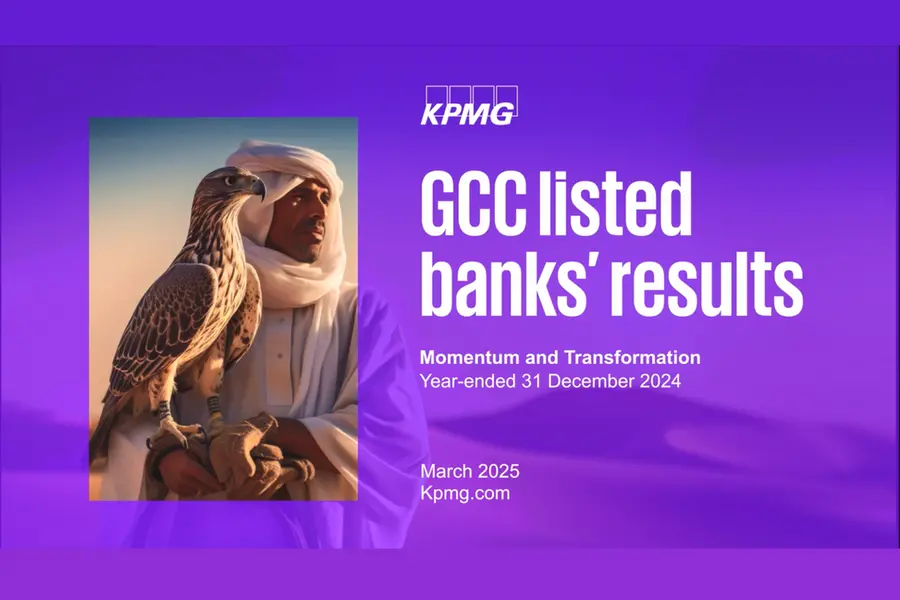PHOTO
Doha, Qatar – KPMG in Qatar has released the tenth edition of its GCC Listed Banks’ Results Report, providing an in-depth analysis of the financial performance and key indicators of leading commercial banks across the region. Titled Momentum and Transformation, this year’s report highlights the sector’s resilience, strategic adaptability, and sustained expansion despite global economic shifts.
Bringing together insights from Financial Services leaders across KPMG’s member firms in the six GCC countries, the report offers valuable perspectives on the evolving banking landscape, emerging industry trends, and financial outlook. By analyzing key performance indicators from the past year, the report aims to support banking leaders in shaping strategies and driving long-term growth.
Omar Mahmood, Head of Financial Services for KPMG in the Middle East, South Asia, Caucasus and Central Asia, and Partner at KPMG in Qatar, commented, "The GCC banking sector remains a pillar of economic stability and growth, demonstrating resilience in the face of macroeconomic uncertainties. The sector’s ability to maintain strong capital positions, enhance asset quality, and embrace digital transformation underscores its commitment to sustainable progress. Looking ahead, we expect a continued focus on managing non-performing loans, cost control, and the integration of AI and ESG principles into banking strategies, ensuring long-term competitiveness and stability."
The report highlights strong asset growth across GCC banks, supported by robust capital adequacy ratios. Profitability saw a notable increase, driven by higher interest margins and disciplined cost control, while net interest margins (NIMs) remained stable despite economic fluctuations. Non-performing loan (NPL) ratios declined, reflecting prudent credit risk management, and cost-to-income ratios remained among the lowest globally, emphasizing continued operational efficiency. Investor confidence has also been reinforced, with bank share prices showing stability in a volatile market.
In Qatar’s banking sector, this year’s report reaffirms Qatar National Bank’s position as the largest bank in the GCC by assets, reaching USD 356 billion. Qatar also continues to lead the region with the lowest cost-to-income ratio at 25.6 percent and the highest coverage ratio for stage 3 loans at 85.1 percent, reflecting strong financial resilience.
Across the GCC, profitability increased by 10.5 percent, driven by loan book growth, stable interest margins, lower loan impairments, and ongoing cost-efficiency measures. Total assets increased by 9.2 percent, supported by lending to high-quality customers. While net interest margins saw a slight dip of 0.1 percent, the overall NPL ratio improved, decreasing by 0.3 percent to 3.3 percent, signaling a continued conservative approach to credit risk management.
Return on Assets (ROA) (1.5 percent in 2023) slightly increased by 0.04 percent compared to the previous year reflecting stable profitability relative to asset growth. Cost-to-income ratios remained stable compared to 2023 at 39%, reflecting the continued focus on cost reductions and operating efficiency. Moreover, the average coverage ratio for stage 3 loans remained broadly in line with prior year at 67%, highlighting the listed banks' cautious provisioning approach.
Looking ahead, KPMG predicts that the GCC banking sector will continue evolving with an increased focus on AI and automation to enhance operational efficiencies, alongside the strengthening of ESG frameworks to embed sustainability within banking strategies. The rise of regulatory technology (RegTech) is expected to support compliance and risk management, while further industry consolidation will likely foster stronger and more competitive financial institutions. Additionally, balance sheet growth is projected to accelerate, driven by strategic investments and effective risk management, ensuring sustained financial stability and resilience.
By offering data-driven insights and forward-looking perspectives, KPMG’s Momentum and Transformation report serves as a valuable resource for banking leaders, regulators, and policymakers navigating an increasingly complex financial landscape.
For more information, please contact:
Huda Ibrahim – hudai@kpmg.com
Bassel Abou Ayash – babouayash@kpmg.com
For additional details about KPMG in Qatar and our privacy policy, visit www.kpmg.com.
About KPMG in Qatar
KPMG is a global organization of independent professional services firms providing Audit, Tax and Advisory services. KPMG is the brand under which the member firms of KPMG International Limited (“KPMG International”) operate and provide professional services. “KPMG” is used to refer to individual member firms within the KPMG organization or to one or more member firms collectively.
KPMG firms operate in 142 countries and territories with more than 275,000 partners and employees working in member firms around the world. Each KPMG firm is a legally distinct and separate entity and describes itself as such. Each KPMG member firm is responsible for its own obligations and liabilities.
KPMG International Limited is a private English company limited by guarantee. KPMG International Limited and its related entities do not provide services to clients.
For more detail about our structure, please visit kpmg.com/governance.




















